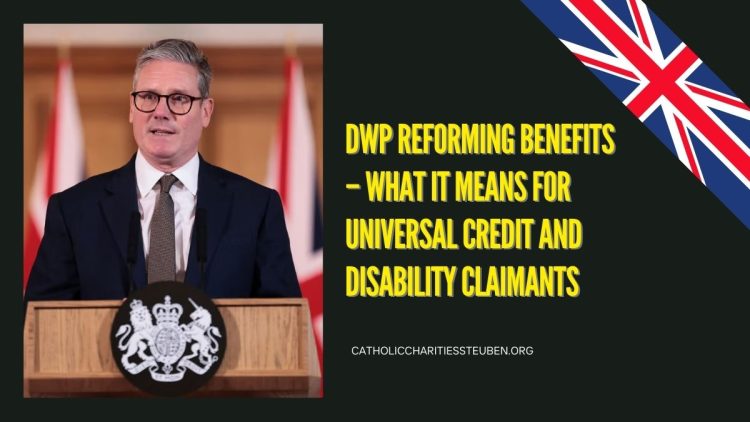The UK government has announced significant changes to the welfare benefits system, which have stirred considerable debate across the country.
Central to these reforms are Universal Credit (UC) and Personal Independence Payment (PIP), two vital programs that support individuals with disabilities and long-term health conditions.
Set to take effect starting in 2026, these changes aim to make the welfare system more sustainable and encourage greater workforce participation.
However, disability rights advocates, economists, and community leaders have raised concerns about the potential adverse effects on vulnerable groups, particularly those with chronic health issues.
This article explores the upcoming reforms, who will be impacted, and offers tips on how to prepare for these changes.
Overview of DWP Benefits System Reforms
The proposed changes to UC and PIP represent a major overhaul in the UK’s welfare landscape. Designed to stimulate employment and reduce government expenditure, these reforms will significantly alter the financial landscape for millions of recipients.
For those currently receiving benefits or those planning to apply, it’s crucial to understand the upcoming modifications and take proactive steps to mitigate any potential impacts. These reforms are expected to shape the welfare system for years to come.
Key Details of the DWP Reforms
| Aspect | Details |
|---|---|
| Universal Credit Health Element | Reduced from £97 to £50 per week for new claimants from April 2026, frozen until 2029/30. |
| Standard Allowance Increase | Incremental rise from £92 in 2025/26 to £106 by 2029/30. |
| PIP Eligibility Criteria | From November 2026, claimants must score at least 4 points on a single daily living activity. |
| Estimated Financial Impact | 3.2 million households could lose an average of £1,730 annually. |
| Poverty Projection | Up to 250,000 individuals may fall into relative poverty. |
| Resource for Claimants | GOV.UK Official Page |
Core Aspects of the Reform
Universal Credit Health Element Reduction
A key aspect of the reforms is the reduction in the health-related element of Universal Credit. Currently, claimants with Limited Capability for Work and Work-Related Activity (LCWRA) receive an additional £97 per week.
From April 2026, this support will decrease to just £50 per week for new claimants, with the amount frozen until 2029/30. Existing recipients will retain the current £97 rate, but its real value will be eroded by inflation.
Increase in Standard Allowance
To offset the reductions in the health element, the government plans to gradually raise the Universal Credit standard allowance.
Starting at £92 in 2025/26, this amount will increase to £106 by 2029/30. This is part of the government’s effort to maintain the overall adequacy of benefits while encouraging people to join the workforce.
Tighter Eligibility for PIP
The government is also tightening the eligibility criteria for Personal Independence Payment (PIP), which assists those with long-term disabilities or health conditions.
Starting in November 2026, claimants will need to score at least 4 points on a single daily living activity to qualify.
This change represents a shift from the current system, which allows a cumulative points score across multiple activities.
The government estimates that 1.2 million people could lose all or part of their PIP benefits as a result of these stricter requirements.
Who Will Be Affected by the Reforms?
Current Claimants
- Universal Credit: Existing claimants receiving the LCWRA element will continue to receive the £97 rate, though it will be frozen, reducing its purchasing power over time.
- Personal Independence Payment: Current PIP recipients will not be immediately affected. However, reassessments based on the new criteria will begin in November 2026.
New Claimants
- Universal Credit: Individuals applying for UC after April 2026 will be subject to the reduced health element and may experience lower weekly benefits.
- Personal Independence Payment: New claimants applying after November 2026 will face the stricter eligibility rules, which could make it more difficult for those with less visible disabilities to qualify.
Practical Steps to Prepare for the DWP Reforms
Review Your Current Benefits
Take time to understand how your current UC or PIP benefits are calculated. Familiarize yourself with the specifics of the new criteria to ensure that you are prepared for any future changes.
Plan Ahead for 2026
If you’re nearing the time to claim benefits, consider applying before the reforms take effect. Claiming UC before April 2026 or PIP before November 2026 could ensure you receive higher support.
Ensure Medical Evidence Is Updated
Make sure that your medical condition is well-documented with up-to-date reports from your GP and specialists. This will be vital for both PIP and UC assessments.
Seek Professional Support
Reach out to advisory services like Citizens Advice, Scope, or Disability Rights UK for personalized guidance. These organizations can help you navigate the changes and provide advice tailored to your circumstances.
The upcoming DWP reforms to Universal Credit and Personal Independence Payment will significantly impact claimants across the UK.
While the reforms aim to encourage employment and sustainability, they could have severe financial consequences for vulnerable individuals, particularly those with long-term health conditions.
It is essential for both current and prospective claimants to stay informed, act early, and seek professional advice to ensure they are adequately prepared for the changes.
FAQs
What is the new Universal Credit health element reduction?
The health-related element of Universal Credit will be reduced from £97 to £50 per week for new claimants starting April 2026, and it will remain frozen until 2029/30.
Who will be impacted by the new Personal Independence Payment criteria?
Starting in November 2026, anyone applying for PIP will need to score at least 4 points on a single daily living activity, potentially affecting up to 1.2 million claimants.
How can I prepare for these reforms?
Review your benefits, plan ahead to apply before the reforms take effect, and ensure your medical evidence is up to date. You may also want to seek advice from organizations such as Citizens Advice or Disability Rights UK.

